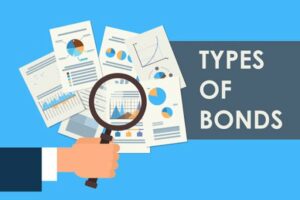Bonds are credits made to enormous associations. These incorporate enterprises, urban communities, and public governments. An individual bond is a piece of a huge credit. That is on the grounds that the size of these substances expects them to get cash from more than one source. Bonds are a kind of fixed-pay venture. Different sorts of ventures are cash, stocks, wares, and subsidiaries.
Types of Bonds
There are a wide range of types of bonds. They differ as indicated by who issues them, length until maturity, interest rate, and risk.
The most secure are short-term U.S. Treasury bills, however they additionally pay the least interest. Longer-term Treasurys, similar to the benchmark 10-year note, offer somewhat less danger and insignificantly higher yields. TIPS are Treasury securities that ensure against swelling.
Metropolitan bonds are given by urban communities and regions. They return somewhat more than Treasuries however are somewhat more hazardous.
Corporate securities are given by organizations. They have more danger than government bonds since partnerships can’t increase government rates to pay for the securities. The danger and return rely upon how credit-commendable the organization is. The most lucrative and most noteworthy danger ones are called garbage bonds.
How Bonds Work
The getting association vows to take care of the bond at a settled upon date. Up to that point, the borrower makes settled upon interest installments to the bondholder. Individuals who own bonds are additionally called loan bosses or debtholders. In the days of yore, when individuals kept paper bonds, they would recover the interest installments by cutting coupons. Today, this is totally done electronically.
Obviously, the account holder reimburses the head, called the assumed worth, when the bond matures.9 Most bondholders exchange them before they develop toward the finish of the credit time frame. They can just do this in light of the fact that there is an optional market for securities. Bonds are either traded on an open market on trades or sold secretly between a representative and the lender. Since they can be exchanged, the worth of a bond rises and falls until it develops.
Disclaimer: The views, suggestions, and opinions expressed here are the sole responsibility of the experts. No journalist was involved in the writing and production of this article.




